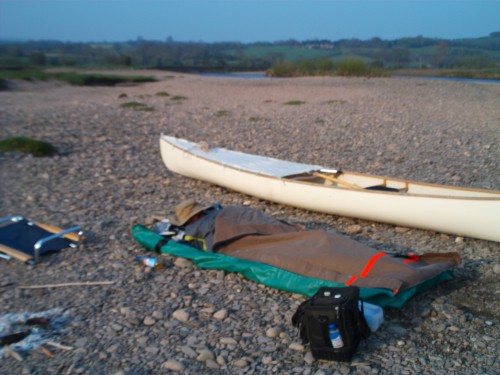“Wild Camping” meaning camping out amongst nature away from a managed campsite, is one of the most fantastic and wild experiences you can have, without having to journey to Africa or the Arctic Circle. It’s the best way to really tune in to nature, experience the seasons changing and the wildlife around you, and for canoeing there’s no richer experience than paddling your own way along a river or lake, stopping to camp over night under the stars, and then waking up surrounded by the sights and sounds of nature before you move of on your journey the next day. But what are the rules and laws you need to know about?
When it comes to rivers, there’s an advantage in that as the river level changes it will expose the river bed, which makes it possible to have a “no-trace” wild camp. In practice you can wild camp on the shingle beaches anywhere along the navigable parts of River Wye (because landowners are so used to recreational paddlers) but this is also true on other rivers subject to local conditions. We’ve been doing it for 20 years on the Wye without ever having any problem even though technically, legally you probably need to seek permission from the landowner, but of course finding out who’s the landowner is not easy, but if you do know then of course stop to ask. Remember trespass is not an offence, only trespass causing damage.
If you can find an actual island in the river it’s case that’s counted as the river bed so no permission needed; but there’s no need to go hunting for an island, as it’s really no problem provided you always follow some basic rules:
- no damage
- no litter
- no noise
- no trace left

A Simple Wild Camp, with minimal impact.
Campfires & Firewood
Having a campfire is a key part of the experience of camping and wild-camping where it’s allowed, especially in winter to keep warm of course, and for cooking. Clearly conduct a risk assessment in terms of vegetation and fire risk and observe any local guidance. Don’t burn waste (plastic, paper wrapping, litter) – the fumes can be harmful and the residue may be impossible to clear up. Be aware when collecting firewood that deadfall wood is a key provider of nutrients to the ecosystem, via fungi and insects; don’t ‘harvest’ from one spot in woodland or on the vegetation on the riverbank – washed up driftwood is what should be used. Always burn off any logs before you go rather than leaving half-burnt wood around which lasts for years – don’t throw half-burnt logs into the river either as they’ll just float down and end up somewhere else. Don’t have a bigger fire than you need, extinguish the campfire with water, then spread and tread the ash well into the stones, until you can barely see anything, and you’re ready to go. One point: be aware that either wet stones or stones with air pockets in can explode in the heat of the fire – it’s only happened once to me in the last 10 years, but it can happen – take a first aid kit.
Water Levels
Remember water levels can change rapidly depending on weather upstream in the mountains, so be aware of whether the river is going up or down and keep an eye on the river level webcams before you go, and on the river itself and skies when you’re out. Be ready to change your plans if the weather changes significantly.
Camp Rules
Don’t fish either as you’ll be raise unnecessary and very real concerns of poaching; and don’t wild camp in an area that is clearly managed for fishing specifically, it’s not welcomed there.
Keep to no more than 3 people/boats in a group at one site, find separate sites if necessary. Use a swag or bivvy and tarp or a small natural-colour tent rather than a monstrous orange tunnel tent if possible! Best to keep a fairly simple camp and not spread all your gear around either, particularly anything that could look like litter – plastic bags, bottles etc. keep them stowed out of sight. Don’t stay more than one night in the same spot, because it’s not your land for a holiday – arrive late in the day and leave early.
Sometimes the landowner will come down to take a peek in the morning, or late at night, and if you follow the rules above you’ll get nothing more than a friendly wave or a chat about the river and the weather – they can see you are respecting the environment and their land, and just enjoying the outdoors.
(Necessary Disclaimer: we’re not legal experts so read up online yourself if you’re concerned and seek out the local knowledge in your area; publishing this guide doesn’t make us responsible in any way – enjoy the wilds of our wonderful country! Thanks.)
